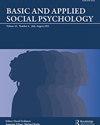“I’ll Be There”: Improving Online Class Attendance with a Commitment Nudge during COVID-19
IF 1.8
3区 心理学
Q2 PSYCHOLOGY, SOCIAL
引用次数: 6
Abstract
Abstract Class attendance is an important predictor of academic success, but students encounter behavioral barriers preventing them from attending. In this experimental study, we investigated a commitment intervention to improve online attendance among university students (n = 973) during the COVID-19 pandemic. In the experimental condition, we asked students to commit to attending all classes and divided this group into students who made the commitment and those who did not commit. The data was analyzed from a psychological perspective (the effect on the individuals who responded positively to the commitment request) and a policy perspective (the effect for all individuals that received the request). No intervention effect was found when comparing students’ attendance in the experimental condition to the control condition, but students who made the commitment attended class more often than non-committing students and those in the control condition. Exploratory analyses revealed that the intervention effect was found in the course with lower attendance, indicating that a ceiling effect possibly prevented the intervention from showing results regarding attendance. However, exploratory analyses also revealed selection bias as a possible explanation for the effects. Additionally, the intervention backfired for non-committing students, reducing their attendance. Future research should focus on different strategies to improve online attendance.“我会在那里”:在COVID-19期间通过承诺推动提高在线课堂出勤率
课堂出勤率是学业成功的重要预测指标,但学生遇到的行为障碍使他们无法参加。在本实验研究中,我们调查了在COVID-19大流行期间提高大学生在线出勤率的承诺干预(n = 973)。在实验条件下,我们要求学生承诺参加所有课程,并将这一组分为做出承诺的学生和未做出承诺的学生。数据从心理学角度(对承诺请求做出积极回应的个体的影响)和政策角度(对所有收到请求的个体的影响)进行分析。实验条件下学生出勤率与对照组比较未发现干预效应,但做出承诺的学生出勤率高于未做出承诺的学生和对照组。探索性分析显示,在出勤率较低的课程中发现了干预效果,这表明天花板效应可能阻止了干预在出勤率方面的结果。然而,探索性分析也揭示了选择偏差可能是影响的一种解释。此外,这种干预对不用功的学生产生了适得其反的效果,减少了他们的出勤率。未来的研究应该关注提高在线出勤率的不同策略。
本文章由计算机程序翻译,如有差异,请以英文原文为准。
求助全文
约1分钟内获得全文
求助全文
来源期刊

Basic and Applied Social Psychology
PSYCHOLOGY, SOCIAL-
CiteScore
4.50
自引率
12.50%
发文量
7
期刊介绍:
Basic and Applied Social Psychology (BASP) emphasizes the publication of outstanding research articles, but also considers literature reviews, criticism, and methodological or theoretical statements spanning the entire range of social psychological issues. The journal will publish basic work in areas of social psychology that can be applied to societal problems, as well as direct application of social psychology to such problems. The journal provides a venue for a broad range of specialty areas, including research on legal and political issues, environmental influences on behavior, organizations, aging, medical and health-related outcomes, sexuality, education and learning, the effects of mass media, gender issues, and population problems.
 求助内容:
求助内容: 应助结果提醒方式:
应助结果提醒方式:


